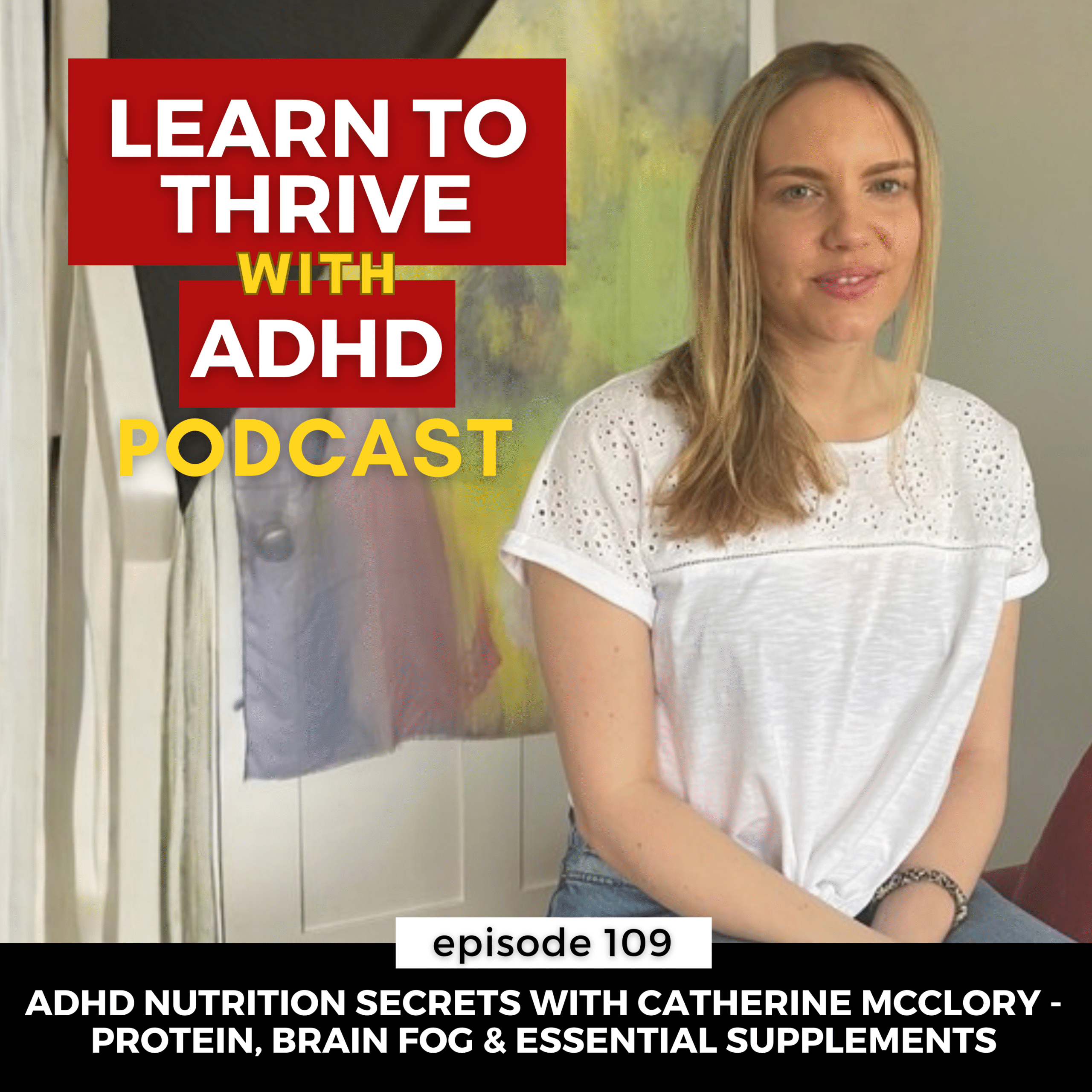Episode Summary:Are you struggling with ADHD symptoms despite medication? In this episode, we dive deep into ADHD nutrition with Catherine McClory, a Registered Nutritional Therapist who discovered that proper nutrition for ADHD transformed her symptoms after her diagnosis at age 35. Learn how specific dietary changes can dramatically improve your focus, energy, and brain fog.
Key Topics Covered:
ADHD Nutrition Fundamentals: The Protein-Dopamine Connection
- Why 25-30g of protein per meal is non-negotiable for ADHD brains
- How tyrosine (amino acid) converts to dopamine
- What 30g of protein actually looks like:
- 1 palm-sized chicken breast
- 3-4 egg omelet (not just 2 eggs!)
- Multiple plant protein sources for vegetarians
Brain Fog Culprits & Solutions
- The iron deficiency epidemic in women with ADHD
- Why even “low normal” iron levels cause symptoms
- How stress impacts executive function
- The gut-brain connection and its role in mental clarity
Hormones & ADHD: The Monthly Rollercoaster
- How menstrual cycle phases affect executive function
- Why ADHD symptoms worsen during the luteal phase
- Estrogen’s role in dopamine and serotonin production
- Adapting nutrition strategies to your cycle
The Essential ADHD Supplement Stack
- B-Complex Vitamins: Support nerve transmission and combat stress depletion
- Magnesium Bisglycinate (300mg): Take 1 hour before bed for better sleep and calm
- Lion’s Mane Mushroom: Boosts brain-derived neurotrophic factor (BDNF) and supports gut health
- Omega-3 (DHA/EPA): Essential for brain function (eat oily fish 3x/week or supplement)
Practical Takeaways:
- Always pair carbs with protein (hummus with veggies, nut butter on toast)
- Address nervous system regulation before making major dietary changes
- Try 4-4-4 breathing: inhale 4, hold 4, exhale 4 for 5-10 minutes daily
- Consistency matters: give supplements 12 weeks to show full effects
- Check supplement quality through third-party testing
Notable Quotes: “Our executive function is going to change throughout the month, and that is related to fluctuating hormone levels.”
“I’m continually sending my clients back to their GP for blood tests. I continually see really low levels of certain micronutrients like iron, B12, folate that just haven’t been picked up.”
About Catherine McClory: Catherine is a Registered Nutritional Therapist specializing in women’s health and nutritional therapy for ADHD. She focuses on supporting women through conditions like PMS, PMDD, PCOS, and endometriosis using personalized nutrition and lifestyle medicine.
Resources Mentioned:
- Magnesium Bisglycinate supplementation
- Lion’s Mane mushroom benefits for ADHD
- Omega-3 supplementation guidelines
- Protein portion visual guides
Connect with Catherine:
- Website: naturalcyclesnutrition.co.uk
- Instagram: @naturalcyclesnutrition
- YouTube: @CathNutritionalTherapist
- Email: catherine@naturalcyclesnutrition.co.uk
Action Steps:
- Calculate your current protein intake – are you hitting 25-30g per meal?
- Consider getting iron and B12 levels tested
- Implement one stress-reduction technique this week
- Track your energy and focus patterns throughout your menstrual cycle
- Research quality supplement brands with third-party testing
Disclaimer: This episode is for informational purposes only. Please consult with your healthcare provider before making significant dietary changes or starting new supplements, especially if you’re on ADHD medication.
Free Resources:
Facebook: https://www.facebook.com/learntothrivewithadhd/
Visual Goal Board Canva templates + Trello board template: www.learntothrivewithadhd.com/closingtheloop
Learn more about private coaching: https://learntothrivewithadhd.com/services/
Free ADHD Resources: https://learntothrivewithadhd.com/freeresources/
Website: https://www.learntothrivewithadhd.com/
LinkTree: https://linktr.ee/learntothrivewithadhd
Instagram: https://www.instagram.com/learntothrivewithadhd/





